 The year is 1969. Toyo Harada, chairman and founder of the Harbinger Foundation and also one of the most powerful psiots (a psiot is a person in the Valiant Universe with superhuman abilities; in this case psychic or telepathic) in the world, does a “brain scan” on his trusted aide Hunter, a black man and also a psiot, to see if there is any deception in him. While doing the scan, Harada comes across images of Hunter leading the charge in his people’s fight with not only police forces, but for their dignity and their rights. After the scan, Hunter comments to Harada about what he saw, calling it his “power trip” and referring to it as a day dream. Harada’s response; in typical PC/comic book fashion; was one of pacification. Harada explains that he understood why Hunter felt that way and that it is
The year is 1969. Toyo Harada, chairman and founder of the Harbinger Foundation and also one of the most powerful psiots (a psiot is a person in the Valiant Universe with superhuman abilities; in this case psychic or telepathic) in the world, does a “brain scan” on his trusted aide Hunter, a black man and also a psiot, to see if there is any deception in him. While doing the scan, Harada comes across images of Hunter leading the charge in his people’s fight with not only police forces, but for their dignity and their rights. After the scan, Hunter comments to Harada about what he saw, calling it his “power trip” and referring to it as a day dream. Harada’s response; in typical PC/comic book fashion; was one of pacification. Harada explains that he understood why Hunter felt that way and that it is
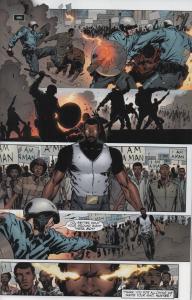
“only natural”, and admonishes him to think of the good his corporation could do for all “regardless of color”. Hunter affirms his loyalty to Harada, assuring him he will not leave his side. This scene is more commonplace in comics than one would guess. It is ok for the superhero to be angry about what is happening to his people, but his responsibility to the whole of mankind comes first. Put another way and in the context of the times; it’s ok to be angry that police are beating your friends and family, it’s ok to be angry that you are denied basic rights, but right now I need you to be committed to my cause and my agenda and do what I need you to do. Hunter is killed during the fight with the villain in the story, and it is revealed also that the villain had indeed lodged himself into Hunter’s consciousness, waiting for the right time to strike. Hunter is now denied the chance to do anything to help his people in their struggle for equal rights.
The Struggle for Civil Rights
The 60’s was the scene of social unrest and turbulence which centered around granting Blacks the equal rights that they were due. Blacks were no longer going to sit idly by and be treated like second class citizens they had been regarded as for years, and as it happened before the start of the Civil War, members of the government as well as a growing number of the white citizens of the country, were feeling the way blacks felt, and began to rally around their cause. Scenes of teenagers marching and taking a defiant stand against the unfair and unjust treatment became regular, as they, too, fought for a better future. Even after Martin Luther King Jr. made his great “I Have a Dream” speech, the resistance was great, and violence towards blacks increased. Then it happened; the bombing of the 16th Baptist church in Birmingham, which killed 4 little girls, seriously injured another one, and injured 20 more people on Sept. 15 1963 and drew more national attention to the struggle than anything else that occurred. The killing of 4 innocent children brought the nation together in protest. Protestors gathered at the site of the bombing and violent clashes between them and the police rocked the city. The government did what it minimally could in sending in troops, but that

did nothing to quell the anger felt by Blacks. The country was pushed to the limits as it searched for a way to reverse the negative thinking and ill-treatment that some of its populace held against Blacks, and Black leaders were doing what they could to stand with dignity against the treachery committed against them and yet at the same time reel in the desire to do violence against their tormentors. The bombing is considered directly responsible for garnering the support needed for the passage of both the Civil Rights Act of 1964 and the Voting Rights Act of 1965. The persons responsible for the bombings were eventually brought to justice for the crimes; the first in 1977 (and died in prison in 1985) and two others in 2001 and 2002, with the fourth person dying in 1994 before he could be brought to trial, but it was revealed once FBI documents became public that the bureau had information on the bombing by 1965 and did nothing about it.
The Curious Cases of Icon and the Blue Marvel
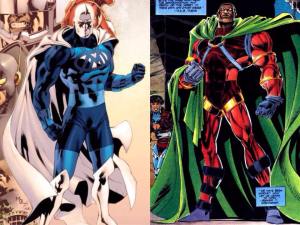
In 1993 a history making endeavor came into fruition with the creation of Milestone Media and the publishing and distribution deal the company had with DC comics, in which DC would publish and distribute the titles coming out of the Milestone Universe. The company introduced some of the most exciting characters in comics; none more so than their flagship character, Icon. Icon was a hero of immeasurable strength; both physical and of character. Rocket, his sidekick gave him that name, because she saw him as a symbol to be held up to his people. Icon tells Rocket his backstory, how he crash lands on this planet in 1839, and uses his ship to transform himself into an infant of the first humanoid species his ship came in contact with. He crashes in the deep south during slavery, and the person he comes in contact with is a slave woman, so he essentially is reborn a slave. He was raised on a plantation, and helped with the Underground Railroad and also fought for the Union Army during the Civil War. He got a college degree during reconstruction, met and married his wife during the Harlem Renaissance, which afterwards they moved to Paris. He fought with the allies in WWII and returned to the states, and after the death of his wife, settled into a mundane existence. This existence included living through the second biggest fight that his adopted race had ever fought; he had already lived through slavery, being raised on a plantation, so he knew the oppression and tyranny his people had gone through; and doing nothing? He had fought once before for his people’s freedom in the Civil War, and fought oppression and tyranny overseas with the allies during WWII. Was there not anything he could do in defense of his people during this pivotal time in their history?
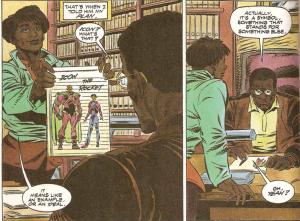
Motivation is either intrinsic or extrinsic; it either comes from the inside or the outside, with intrinsic motivation being equated with passion; so where does Icon’s motivation come from? Shouldn’t his upbringing and experience as a slave incite his passion and cause him to act, or did it cause his indifference? Shouldn’t the mistreatment of and the “second class citizen” status of his race inspire him to pursue even the legal avenues in his profession as a lawyer to try and aid the plight of his people? Is there anything that should have motivated him to at least jump on a Freedom Ride? Even after all these years after his comic ended publication, these questions persist. Then there is the Blue Marvel…
Adam Brashear was a veteran of the Korean War in which he earned two silver stars. While in the military he suffered indignity after indignity from the white racist service members, but was also befriended by a white soldier whom was one of the people Brashear saved while earning one of the silver medals. This soldier; Conner; considered Brashear a brother, and physically fought against his own race in defense of Brashear. After leaving the military, Brashear graduated magna cum laude from an Ivy League school with a degree in Electrical Engineering and a PhD in Theoretical Physics. An unfortunate accident occurred during a demonstration of some of the research Brashear was conducting for the military gave both he and Conner extraordinary powers, and the Blue Marvel was born. The Blue Marvel was the people’s champion and beloved by all. His amazing feats captured the imagination of the public, including White America, who thought of him as one of their own. Meanwhile, Conner’s brother; an FBI agent who had gone undercover to infiltrate the KKK; was killed during his mission, which sent Conner over the edge. Conner, now just as powerful as the Blue Marvel, became hell bent on destroying society, feeling that it would never change its racist ways and needed to be rebuilt. During their battle, the Blue Marvel’s mask is torn, and it is revealed that he is Black.
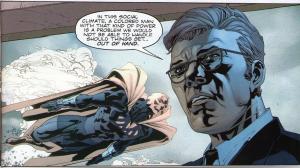
The country immediately turns on him, with white America reacting in fear of the “Superpowered Negro”, and black America lashing out at him for not doing something about the violence they were suffering at the hands of the whites. The government moved to do something about what it perceived as a threat, and the then President issued an edict ordering him to cease and desist all activities as the Blue Marvel. Being the most powerful being on the planet, the Blue Marvel could have done whatever he wanted to do, what he chose was the most confusing part. He obeyed the edict, and the Blue Marvel disappeared. When Conner reappeared 50 years later to threaten the earth again, it took a considerable amount of prodding to get Brashear to help defend against Conner’s assault. When Brashear confronted Conner, Conner told him he felt he was weak. Brashear defended his obeying the edict as his wanting to maintain peace, but Conner passionately tells him how his weakness was not in obeying the edict, but in his failure to act when it was in his ability to do so. The Blue Marvel ultimately defeats Conner, giving him the clichéd “I see the good in everyone” speech. When we reread the words Conner had to say, the question comes up as to why Brashear did nothing at all. Let’s think about that; Brashear was a decorated War Veteran, and a Dr. of Physics. From that station alone he could have done something to further the goals of the Civil Rights movement. Martin Luther King used his status as a minister to garner support for his nonviolent movement, and even acted defiantly yet peaceably against those who would try to bar him from his goal. Could not Brashear have done the same? With all the patriotism and passion Brashear displayed in obeying the edict, did he not have that same passion and sense of loyalty to his people? In issue #6 of the Mighty Avengers, Luke Cage confronts the Blue Marvel about the decision to obey the edict. His words were quite convincing as he admonished Brashear that the people had to know that he stood for them, and would stand for them. This will forever be the question asked of Brashear.
…and then there is the New American…
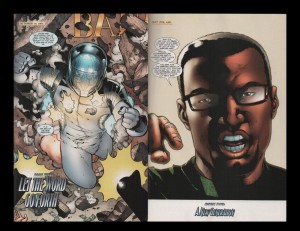
The 2007 graphic novel “The American Way” by John Ridley is the story of a fictional government agency called the Federal Disaster Assistance Administration which was formed in the 1940’s when the first superhuman was found. The FDAA knew it would only be a matter of time before its enemies found their own super person, so it then went about the task of recruiting ones they found, and through the use of human experimenting, after decades of attempts, were able to create their own. With a cadre of super-people on hand, the FDAA formed an organization called the Civil Defense Corps. The CDC existed in order to “protect the American way of life”, and to that end, the FDAA would put on big, extravagant, fake, shows for their enemies, to let them see what America had to protect itself with. Although some of the heroics were real; the occasional rescuing someone from a burning building or stopping a robbery; the action the CDC saw was merely staged events with the winners and losers already set before the battle even took place. During one of the fake battles, the hero who came to symbolize America’s hope, dies. The hero smoked two packs of cigarettes a day, and the exertion caused him to have a heart attack. To the country though, it looked as if the villain the CDC was fighting had killed him. In order to restore the country’s faith, it is suggested that a new hero must step in to take the dead hero’s place. This hero can become a symbol for all races to admire and will act as a catalyst to help the country heal from the racial tensions it is experiencing which seems like it will tear the country apart. Then those seven words were uttered that couldn’t be taken back; “We give the people a colored hero”.
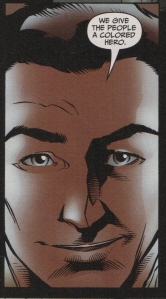
Here is where we meet Jason Fisher. Jason is a graduate of Howard University with a master’s degree and also served three years as a paratrooper in the US Army from which he was kick out for striking a junior ranking white soldier for calling him a nigger. The results of Jason’s psychological testing concluded that he would be the perfect candidate for the Negro superhero, even though he had a bad attitude and was considered “uppity”. Jason was resistant and defiant at first, then came the old pacification speech from the recently hired Wesley Catham who came up with the idea of having a Negro superhero and pushed hard for Jason to see the “big picture” and open his mind to doing more than just helping out the Negro race, but help mankind. Jason agreed to the offer, and went and told his brother, who was an organizer for the Freedom Rides taking place down south. Jason underwent the gene manipulation and therapy that would give super strength and invulnerability, but as a control safeguard, left with active pain receptors, so he would feel what was happening; such as being on fire; but not actually suffer any physical effects from it. Jason would have to wear a helmet at first to hide his identity, or so the plan went, and after a few years of him acting heroic and as a team player, it would be revealed that he was actually Black. He reluctantly went along with the helmet. At first he is widely accepted and much beloved. Even the members from the south, some still held strong racist beliefs, embraced the new hero, named the New American, and as with members of the adorning public, stating that even if he were colored they would still love him. Careful what you wish for. A fight breaks out among the members of the CDC as they try to apprehend one of their own for slaughtering his family. During the course of the battle, Jason is struck hard. The other members of the CDC are able to subdue the rouge member while Jason recovers, and when the remaining members come over to check on Jason, his faceplate is broken on his helmet, and it is revealed that he is black! This causes a split within the CDC with the southerners feeling like they were forced to “rub shoulders” with a colored and that they were lied to and misled and leaving and forming their own group called the Southern Defense Corp (SDC). They swore to protect the south from the “pervasive” northern attitude of integration, vowing to keep the south segregated. The government releases one of its villains to be a distraction to the race issue, but the villain, who is white, goes on to slaughter a bar full of black patrons and a bus load of Freedom Riders, leaving only Jason’s brother alive but paralyzed. Jason tracks the killer down to Alabama and kills him. The SDC attacks Jason, swearing to bring him to justice for killing a white. Jason manages to escape and comes across a group of blacks. He asks for help, but is turned away for fear of retribution if the whites found out they helped him. Jason is eventually caught and the SDC begins brandishing their own vigilante justice. The CDC comes to Jason’s aid and a battle ensues.
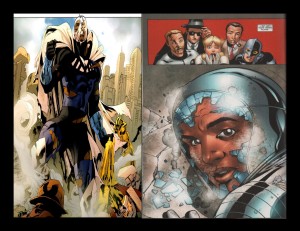
It is Jason who convinces the groups to stop fighting and join together to face the threat of oncoming nuclear missiles, inspiring them to be the heroes the public wanted them to be. In the end, Jason flies off a wanted man, and the race problem is still the same. It is odd how gaining powers for Jason seemingly pacified the passion and fervor he had toward the state of race relations in the country. So strong was Jason’s pride in his race that he tossed out a military career by punching a loudmouth who called him the n-word. Even when first interviewed, Jason was labeled as uppity by the whites in charge because of his defiance. Could his gaining powers change his perspective so drastically? Should the new responsibility gained from acquiring powers changed how he felt his people were treated? Jason’s story is sad because it is his own wants and desires that are taken advantage of. Once it was determined that Jason wanted to be heroic, he was manipulated by the government. He went along with the manipulation, and only became defiant when his brother was injured. Using modern vernacular, Jason is caught in between a “Black Lives Matter” and an “All Lives Matter” moment and both his decision and indecision will affect the whole country. So which is the right choice?
Final Thoughts
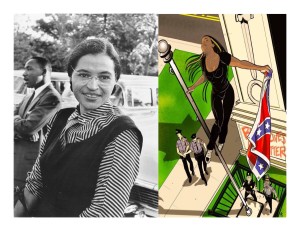
The struggle for equal rights under the law has been and still is the greatest challenge Black America has had to face. “No Blacks Allowed” and “White Only” were the rule of the day, those who stood up for themselves faced the wrath of the white establishment and the violence that came with it. 50 years of attempted institutionalized pacification and forced assimilation and Black America is still struggling to find its identity. This struggle is acerbated by the attitudes of some blacks as well as the perception the world has of us, and to our own discredit, the perception we hold against each other. As with the original civil rights movement, it will take a spark to ignite things. It will take self-sacrifice, belief in what is being done, and most importantly, defiance. The type of defiance that led Rosa Parks to not give up her seat back then, and the kind of defiance that led Bree Newsome to scale the flagpole to remove one of the last symbols of oppression of that time. That defiance, along with sacrifice, will once again win the day!
Here is a list of some of the black heroes from the 60’s and their first appearance:
Gabe Jones– Sgt Fury and his Howling Commandos #1 (May 1963)
Jackie Johnson– Our Army at War #81 (April 1959)- The first non-stereotyped black character in comics
Centurius– Nick Fury Agent of SHEILD #2 (July 1968)
Joseph Robertson- The Amazing Spider-Man Vol. 1 #57 (Aug 1967)
Randy Robertson- The Amazing Spider-Man Vol. 1 #67 (Dec 1968)
The Prowler– The Amazing Spider-Man Vol. 1 #78 (Nov 1069)
Lobo– Lobo #1 (Dec 1965)
Black Panther– Fantastic Four #52 (July 1966)
The Falcon– Captain America #117 (Sept 1969)
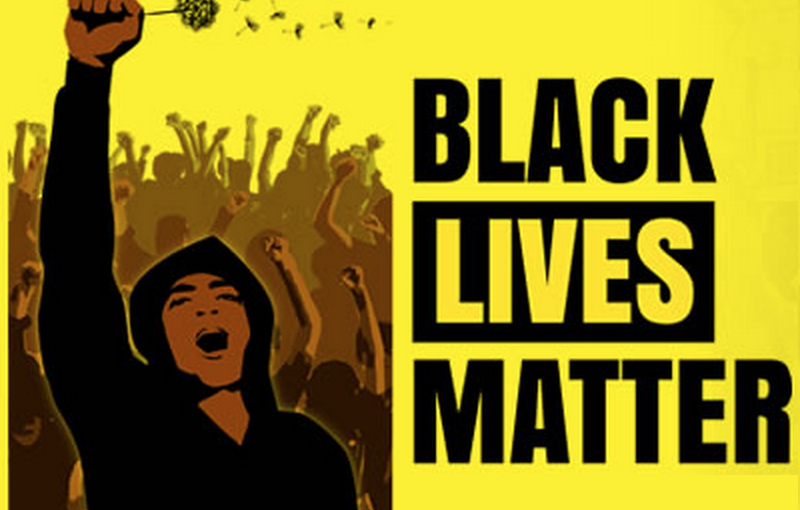
My character “The Shadow Walker” is the first of it’s kind to address the issues of race in a not so “politically fashion” which is probably why I’ve had such a hard time getting companies to even look at him as a potential property. Never the less he is a character that is desperately needed by out youth. He’s contained when necessary and unbridled when fury is called for.
It should be “our” in the 3rd sentence. Please forgive the error.
Just read your article
I thought it was very thought and perceptive .
I need to do some re reading before I cam comment further
Thank you for posting
Commenting specifically on some parts of your article
I did not know about the Valiant (?) comics story you describe at the beginning of your article I am still trying to track it down . But I do agree with the point that ( I think) you make that in the main stream comics Black heroes are shown to be best serving their people and their cause by being team players( where they are not the team leaders ) and working within the system and being patient and not causing trouble
This is the kind of Black Hero the comic creators and the publishers seem to be the most comfortable giving us ( the readers ) or perhaps they think that we are the most comfortable with that kind of hero
I do note that in the Valiant story the Black man is the assistant to the boss
Regarding Icon
I always thought his initial indifference to what was going on in the world ( before Rocket prodded him into being a hero ) was odd . I wondered he was to supposed to a Booker T Washington sort of character concentrating on improving his own situation ( and there by the situation of his people )through education and hard work and moderate habits and staying out of politics and not clamoring for social or political equity
Looking back at the character today before he becomes Icon he seems like almost a Clarence Thomas type
Regarding the Blue Marvel
Then as now I find his back story most unsatisfying He is impossibly noble and accommodating ,agreeing to stand down so the white people will not have to worry about having a Black Superman in their midst To my mind this is weak and lazy writing It was as if the writers thought it was enough to simply deliver up a Black Character and we , the readers would happily and passively accept him . They did not think they had to a good or a well thought out job in creating and presenting the character
Regarding The New American
All my issues are packed away and so I am working from memory here
I really liked that mini series You have to love a super hero team whose line up includes a member known as “The East Coast Intellectual ”
And I liked that the super heroes them selves are just actors in what amounts to a reality show designed to reassure the public and make them fell good about America -( odd that the government was able to keep the whole thing a secret or maybe the people just wanted to be deceived and comforted by a lie )
I thought that the way the Southern members of the team behaved was very plausible
As to it being sad that the state takes advantage of Jason’s wants and desires to have him serve their ends – that is just what the state or the corporation does And perhaps , after Jason acquired the power he eventually realized did not have to fallow the “party line ” or the script and that now he could do what he wanted ( for himself and for his people)
So the final message could be that power equals freedom Finally
I agree whole heartedly with your final thoughts section
The Valiant story is from the comic Harbringer Vol 3: Harbringer Wars Issue #13. The part that is referred too is only a small part of the greater story. The whole Harbringer series was pretty good. I at one time thought of Icon as a Booker T. Washington type as well, and like you, when I reread the story years later, he came off more like Clarence Thomas. He would definitely be a Republican in today’s climate.
Check out our reviews for Adam: Legend of the Blue Marvel for more thoughts of that character.
“The American Way” is still one of my all time favorite stories. I agree with you in saying that power equals freedom; especially in Jason’s case, whereas it was not the gene manipulation that empowered him but rather his defiance to being manipulated by the government that intrinsically motivated him to realize the power he already possessed.
Thank you for your comments and please continue to support us!
I will check out your reviews of Adam The legend of the Blue Marvel
I agree with your comments regarding The American Way
You can count on my continued support
In l defence of Adam Brashear’s decision to stand down(ie retire) on orders from Kennedy(who was his lawful commander in chief as a former US Marine), he had no recourse but to follow a lawful order from a superior officer- which included the President)!
an interesting point and perhaps technically true ( I am not sure if former soldiers are still obliged to fallow orders )
But the” I was just fallowing orders ” excuse /reason has a hollow and uncomfortable ring
True, the claims of German and Japanese military men at Nuremburg and other war crimes tribunals gave “I was just following orders”defence(as did Calley at My Lai) a bad name but JFK could have had Brashear recalled to duty in the USMC and thus had him subject to the orders of his lawful commander in chief. Anyway no military organization can be expected to function if everybody questions/disobeys the orders of their superiors-;et us NOT “throw the baby out with the bathwater!”
Terry
That is a valid point
And I had not considered that Dr Brashear could have been re activated and would have then been subject to the Presidents orders
But I am also reminded of the Port Chicago mutiny
So I would propose ( speaking in the hypothetical )that the character after being re activated continues to act as a hero for the common good . But he submits to arrest and count martial and and serves his sentence
That way the point about the injustice and of the order is made but the respect for the institutions is preserved
While the “just following orders” argument is a good one, we have to remember how the story itself was written. Brasher wasn’t ordered to stand down as a soldier, he was asked to stand down as a civilian acting in an official capacity. He could have said “No”, and continued on with his activities, but instead he flew to the moon and whined and moaned. The mistrust was so great that even in his private life he was monitored.
I had forgotten that he had been monitored even after he had stepped down Thank you for the the remind As I recall he married the woman assigned to keep tabs on him I thought that was all just too improbable
Port Chicago mutiny??? Never heard of it. I heard of the explosion therein that killed several hundred African American sailors in July 1944 but i was unaware of any mutiny. I HAVE ehard of unethical/abusive governmental actions involving African Americans such as the notorious Tuskegee syphilis study and J. Edgar Hoover’s COINTELPRO programme in real life so the covert monioring of Brashear is NOT improbable!
I guess what is really bothering me about Blue Marvel as a whole is that he comes off as naive. I can partly understand his motives for obeying the request made to cease his activities, but I can’t understand why he would not think that they wouldn’t send someone to watch him. I can understand that because of his experience in college and the military he wouldn’t react with shock to being approached by a white woman, but common sense should have told him to be on his guard. With all his powers and technology, he could have easily dug into the background of his wife, but he never once became suspicious of her. That is just unbelievable to me. Call me crazy or bigoted, but during those times, it should have set off all kinds of alarms that a white woman has suddenly taken interest in a black man.
Responding to Terry Washington ‘s comment
here is some info on the Port Chicago mutiny…..http://www.blackpast.org/aaw/port-chicago-mutiny-0
Responding to Marcus Roberts
I agree
The character does comes off as being impossibly naive a lot of the time
I thought it was all weak and lazy writing , as if the editor wanted to retro fit a Black Superman into the story line / universe but did not think the writer had to spend a lot of time or effort or thought on the character’s back story
The underlying message I received was that the writer was contemptuous and / or indifferent to his readers thinking we ( the readers and fans )will accept anything
Thanks for sharing that! I was not familiar with this incident until now.
I think it had more to do with establishing the personality of the character versus the writer’s effort. It seems that Brashear was intentionally made to be passive- aggressive; acting out of need instead of want; and to pull that off he had to be both a little naive and subservient. I just think the writer went to far in the naive department.
Not a problem
Always happy to help and share
I agree
I just wish the character had been a more willing to stand up for justice rather than just fallow the law
Thanks for the info!
You are welcome
really enjoyed the article and appreciate the effort put into it. i saw that blue marvel is to be a part of one of the new avengers team in the “all new, all different” marvel line starting up next month. very curious where they take his character as well as well as well as the rest of the diversified avengers line ups. interesting times over at marvel comics these last couple years. (black captain america, asian hulk, a female thor etc)